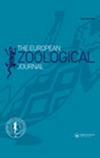Heavenly zoology
引用次数: 1
Abstract
In the Genesis, the Creator gives just one job to the first human: to name animals. Hence, zoologists are on a mission for God! Whatever our personal beliefs, it is very probable that zoology is the basis of our culture. We were hunters, and we had to know animals. We were also gatherers, and so botany is part of our cultural heritage too. Probably males, the hunters, were zoologists, and females, the gatherers, were botanists: our culture started with the study of biodiversity, as witnessed by the cave paintings that make up our first cultural expressions. Strangely enough, when culture became Culture, the knowledge of Nature lost its appeal and we started to become more abstract, developing many other forms of culture that, in general, we ascribe to the Humanities. It is undeniable, however, that we survive just because of the goods and services that we derive from Nature! Apparently, this truism has been forgotten. We give more importance to many other things, and disregard Nature, taking it for granted. We are more interested in the economic capital than in the natural capital. However, we cannot survive if we destroy the natural capital. And we are destroying it. Yes, we all agree that nature is important, and we sign documents, such as the Rio Convention on Biological Diversity, that clearly state that the protection of Nature is a priority. But then we do not care much, and we all agree that the economic capital has to grow, ignoring a very simple natural law: if something grows, something else degrows. The growth of the economic capital usually occurs at the expense of the natural capital. Nothing new. The “naturalists” have been delivering this message for ages. The tragedy is that there is no disagreement about the priorities, and they are clearly stated. But then we behave as if they were not priorities at all. Now, those who care about Nature have a strong ally: a person living in a small state nested in the capital of Italy. His name is Jorge Bergoglio but, some years ago, he changed his name to Francis, due to a new role he was elected to play: the Pope. Francis has recently published an Encyclical entitled Laudato Sì, with the subtitle: On care for our common home. It can be found here: https://laudatosi.com/watch The message is very simple. Economy is ruling our relationship with Nature (our common home) and we are mismanaging it. The words Francis uses are very familiar to us. Ecology occurs 33 times, Species 29 times, Ecosystem 25, Biodiversity 8, even Plankton and inconspicuous species are considered: “Particularly threatened aremarine organismswhichwe tend to overlook, like some forms of plankton; they represent a significant element in the ocean food chain, and species used for our food ultimately depend on them”. Evolution is taken for granted, as reported in this sentence: “Although change is part of the working of complex systems, the speed with which human activity has developed contrasts with the naturally slow pace of biological evolution”! For once, religion and science go hand in hand, as Francis tells us: “... science and religion, with their distinctive approaches to understanding reality, can enter into an intense dialogue fruitful for both”. The times during which people like Giordano Bruno or Galileo Galilei were either set on fire or forced to deny the value of their discoveries, due to contrast with the Holy Books, are over (at least in our part of the planet). The biblical job of “naming animals” means to know Nature, and the Creator, if you believe in these things, wants us to be knowledgeable, especially about Nature. If there is a hell, it is burning for those who did not understand the message of the Bible: Hell burns for them, not for us. It took some millennia, but now, finally, the true message has been clarified by the most qualified authority in this field. And we can be relieved to realize that zoologists go to Heaven. Francis, furthermore, addresses his message to all humans, and not only to the believers in the religion he represents. The problem is ecological, not religious. Religion is just helping science deliver the message. Or vice versa! Darwin (who was agnostic) was afraid about the consequences of his books on the religious beliefs of his contemporaries (especially his wife). I think he would have liked this Encyclical very much.神圣的动物
在《创世纪》中,造物主只给了第一个人类一项工作:给动物命名。因此,动物学家正在为上帝执行一项使命!不管我们的个人信仰是什么,很可能动物学是我们文化的基础。我们是猎人,我们必须了解动物。我们也是采集者,所以植物学也是我们文化遗产的一部分。也许男性狩猎者是动物学家,而女性采集者是植物学家:我们的文化始于对生物多样性的研究,这可以从洞穴壁画中看到,它们构成了我们最初的文化表达。奇怪的是,当文化成为文化时,自然的知识就失去了吸引力,我们开始变得更加抽象,发展出许多其他形式的文化,总的来说,我们把它们归为人文学科。然而,不可否认的是,我们的生存仅仅是因为我们从大自然获得的商品和服务!显然,这个真理已经被遗忘了。我们更重视许多其他的东西,而忽视自然,认为它是理所当然的。我们对经济资本比对自然资本更感兴趣。然而,如果我们破坏自然资本,我们就无法生存。而我们正在摧毁它。是的,我们都同意自然很重要,我们签署了诸如《里约生物多样性公约》之类的文件,明确指出保护自然是一项优先事项。但我们并不太在意,我们都同意经济资本必须增长,而忽略了一个非常简单的自然法则:如果某物增长,另一物就会衰退。经济资本的增长通常是以牺牲自然资本为代价的。什么新东西。“自然主义者”多年来一直在传递这一信息。可悲的是,在优先事项上没有分歧,而且它们是明确规定的。但后来我们表现得好像它们根本不是优先事项。现在,那些关心自然的人有了一个强大的盟友:一个住在意大利首都一个小州的人。他的名字是豪尔赫·贝尔格里奥,但几年前,他改名为弗朗西斯,因为他被选为新角色:教皇。方济各最近发表了一篇名为《赞美Sì》的通谕,副标题是:关爱我们共同的家园。可以在这里找到:https://laudatosi.com/watch消息非常简单。经济支配着我们与自然(我们共同的家园)的关系,而我们却管理不善。弗朗西斯用的词我们都很熟悉。生态学出现了33次,物种出现了29次,生态系统出现了25次,生物多样性出现了8次,甚至浮游生物和不显眼的物种也被考虑在内。“受到特别威胁的是我们往往忽视的海洋生物,比如某些形式的浮游生物;它们代表了海洋食物链中的重要元素,我们的食物物种最终依赖于它们。”进化被认为是理所当然的,正如这句话所述:“尽管变化是复杂系统工作的一部分,但人类活动发展的速度与自然缓慢的生物进化速度形成鲜明对比”!这一次,宗教和科学携手并进,正如方济各告诉我们的:“……科学和宗教以其独特的理解现实的方法,可以进入一场对双方都有成果的激烈对话。”布鲁诺(Giordano Bruno)或伽利略(Galileo Galilei)等人因与《圣经》(Holy Books)对比而被烧死或被迫否认其发现价值的时代已经结束了(至少在我们这个星球上是这样)。圣经中“给动物命名”的工作意味着认识自然,如果你相信这些事情,造物主希望我们有知识,尤其是关于自然的知识。如果有地狱,它是为那些不理解圣经信息的人燃烧的:地狱是为他们而不是为我们燃烧的。这花了几千年的时间,但现在,这个领域最有资格的权威终于澄清了真正的信息。当我们意识到动物学家可以上天堂时,我们可以松一口气。此外,方济各向全人类传达了他的信息,而不仅仅是对他所代表的宗教的信徒。这是生态问题,而不是宗教问题。宗教只是在帮助科学传递信息。反之亦然!达尔文(他是不可知论者)担心他的书会对同时代人(尤其是他的妻子)的宗教信仰产生影响。我想他会非常喜欢这份通谕。
本文章由计算机程序翻译,如有差异,请以英文原文为准。
求助全文
约1分钟内获得全文
求助全文

 求助内容:
求助内容: 应助结果提醒方式:
应助结果提醒方式:


